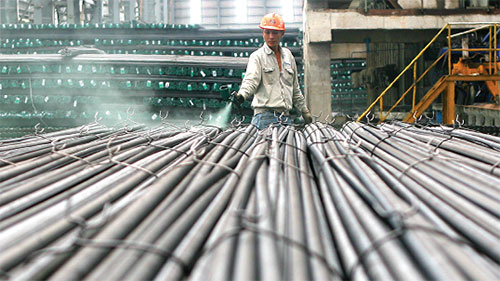Mixed sentiments over steel tariffs

In early March, the Ministry of Industry and Trade (MoIT) decided to impose temporary safeguard duties of 23.3 per cent on steel billets and 14.2 per cent on long steel products for a maximum of 200 days with its Decision No 862/QĐ-BCT.
On December 25 last year, the MoIT issued Decision No 14296/QĐ-BCT on a safeguard investigation into imports of steel billets and long steel products, due to a complaint lodged by four major Vietnamese steel producers including Hoa Phat Steel, Southern Steel, Thai Nguyen Iron and Steel, and Vietnam-Italy Steel JSC.
The four companies said the proposal for an investigation came after a sharp rise in steel billets and long steel products imported into the local market, which has caused serious damage to local production and built up unsold stock.
However, Pomina Steel JSC (POM), which operates a major steel billet refining plant with a capacity of 1.5 million tonnes per year, has sent a proposal to the government to oppose the imposition of protective measures on imported steel. As POM deputy general director Do Duy Thai argued, “The 10 per cent tariff rate levied on imported steel billets (applicable before March 23, the date the MoIT’s decision on temporary safeguard duties took effect) is strong enough to keep locally produced steel billets competitive against imported items”.
In response, a handful of steel industry businesses revealed that despite being a steel billet maker, POM also refines steel billets, so the company shares a common interest with steel importers and in fact mainly uses imported steel billets in its plant.
Customs statistics showed that last year POM imported about 400,000 tonnes of cheap steel billets from China and bought more than 100,000 tonnes from other trading firms to feed production.
Of the 800,000 tonnes of long steel sold last year, POM self-produced only 300,000 tonnes, equal to 20 per cent of its steel billet refining plant capacity. The remainder was produced using imported steel.
Commenting on these figures, Thai recently told VIR that southern steel firms, including POM, use imported Chinese steel billets only for export production to cash in on tax refunds when exporting.
Some steel firms, however, argued that the main reason behind POM’s opposition to imposing protective tariffs on imported steel billets was that POM wants to continue taking advantage of cheap import sources from China.
Customs data shows that in January 2016, POM’s Pomina Steel JSC 2 was one of the largest importers of steel billets, with nearly 29,924 tonnes in total volume that month.
Industry insiders believe that POM is importing steel billets for production rather than self-producing them because its refining plant employs electronic kiln technology, which has more costly production than the traditional blast kiln technology.
In addition, the procedures to import steel billets for production are simpler and less risky compared to procedures for importing steel scraps, which are the materials used to feed electric kilns.
What the stars mean:
★ Poor ★ ★ Promising ★★★ Good ★★★★ Very good ★★★★★ Exceptional
Latest News
More News
- NAB Innovation Centre underscores Vietnam’s appeal for tech investment (January 30, 2026 | 11:16)
- Vietnam moves towards market-based fuel management with E10 rollout (January 30, 2026 | 11:10)
- Vietnam startup funding enters a period of capital reset (January 30, 2026 | 11:06)
- Vietnam strengthens public debt management with World Bank and IMF (January 30, 2026 | 11:00)
- PM inspects APEC 2027 project progress in An Giang province (January 29, 2026 | 09:00)
- Vietnam among the world’s top 15 trading nations (January 28, 2026 | 17:12)
- Vietnam accelerates preparations for arbitration centre linked to new financial hub (January 28, 2026 | 17:09)
- Vietnam's IPO market on recovery trajectory (January 28, 2026 | 17:04)
- Digital economy takes centre stage in Vietnam’s new growth model (January 28, 2026 | 11:43)
- EU Council president to visit Vietnam amid partnership upgrade (January 28, 2026 | 11:00)
















 Mobile Version
Mobile Version